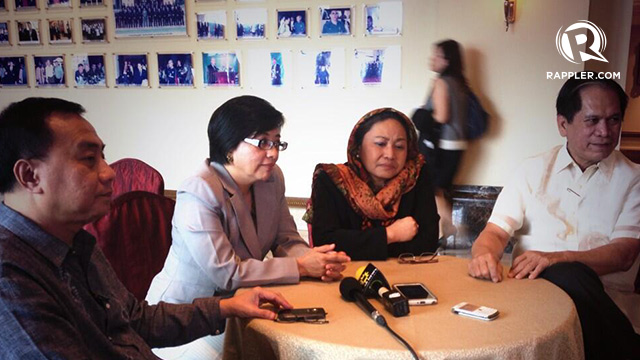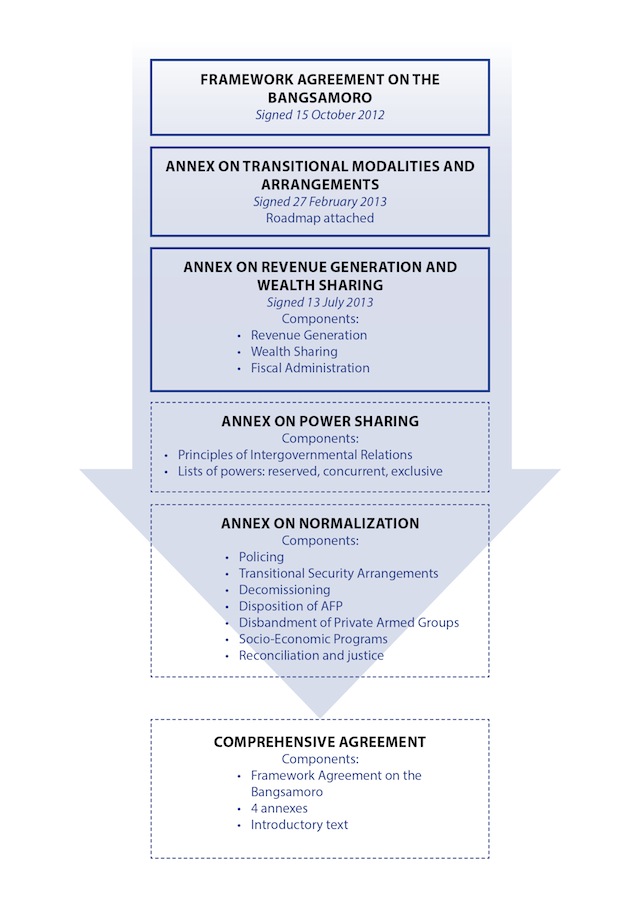
KUALA LUMPUR, Malaysia
(Updated) – After 10 days of discussions in the longest round of talks
between the Aquino government and the Moro Islamic Liberation Front (MILF),
both sides are still struggling to find common ground.
As they race against time
to beat their 2016 deadline to complete the transition toward the proposed
Bangsamoro political entity, the panels on Thursday, September 19, decided to
extend the session for one more day.
But it is unlikely that a
document would be signed and completed this round.
"There is no way we
can finish because, as I said, when we are now overstretched and when people
are overstretched, they are no longer resourceful," MILF chief negotiator
Mohagher Iqbal said.
The issues are just
"too many" and "very difficult," Iqbal added.
The talks are being held
while government troops and members of the rival Moro National Liberation Front
(MNLF) continue to fight it out in Zamboanga
City
Sensitive, emotional
The government and the MILF
are threshing out the final details on how power will be shared between the
Bangsamoro government and the central government, as well as the process of
normalization.
Power, Iqbal said, is the
"heart" of the negotiations, while normalization is the most
"sensitive" and "emotional" aspect as it includes issues on
security.
Government peace panel chair
Miriam Coronel Ferrer said their aim for Friday is just to come up with a
completed text for the annexes.
They would most likely
come back for another round, Ferrer said, since there are new items that still
need to be presented to their principals – President Benigno Aquino III for the
government and Chairman Al Haj Murad Ebrahim for the MILF.
Before flying to Kuala Lumpur
But both sides have conceded
it is unlikely that any annex would be completed by Friday after the first few
days of the talks started slow. Iqbal earlier described it as
"snail-paced."
Power-sharing annex
The Framework
Agreement signed
in October 2012 defined the relationship of the central government and the
future Bangsamoro government as "asymmetric."
Considered the
"heart" of the negotiations, the power-sharing annex discusses how
this assymetric set up would work. It includes 3 kinds of power-sharing
arrangements:
- · Reserved powers for the central government
- · Concurrent or shared powers between the Bangsamoro government and the central government
- · Exclusive powers for the Bangsamoro government
Before this round of talks,
both sides had a working text listing about 60 exclusive powers for the
Bangsamoro and 15 to 16 concurrent powers between the national government and
the proposed entity.
The government decided to
"seek further clarity on the language" to ensure that both sides have
"common understanding on how we intend to operationalize the mechanism
under the law for the future Bangsamoro government," Ferrer said.
From a mere
"listing," the government came up with "sentences" on
concurrent items under the power-sharing annex.
"The provisions we are
working on aims to ensure inclusivity as to the fact of multiple stakeholders
in the area and also the kind of shared concerns of the central government and
the Bangsamoro government and the Bangsamoro people," Ferrer said.
"It should be reflected in our understanding of each provision."
Iqbal earlier said the MILF
does not mind working with just a list of powers under the annex, since
additional details could be furnished in the Bangsamoro Basic Law to be crafted
by the
Transition Commission, which Iqbal also heads.
An example of this
"list" can be found in the "Powers" section of the Framework
Agreement on the Bangsamoro or FAB, which lists down the reserved powers of
the central government.
The FAB includes the initial
list of reserved powers of the central government. What the annex on
power-sharing will define are mostly items under concurrent and exclusive
powers.
Coming from the experience of
the failed Memorandum
of Agreement on Ancestral Domains, government peace panel member Yasmin
Busran-Lao said the government wants to ensure that any document that will come
out of this peace talks will stand the scrutiny of legal experts.
"We don't want people to
see loopholes in the document right away," Lao said in a mix of English
and Filipino.
All their aspirations
The MILF, on the other hand,
wants include all their "aspirations" in the power-sharing annex.
"We know that it might
not be possible at this time, Ferrer said. "This is the kind of balancing
act we have to do. All aspirations have a maximum, we're not saying a minimum
but some kind of a middle ground within the flexibilities of our politics and
our Constitution."
Protocol prohibits panel
members from disclosing specific details of the talks while negotiations are
ongoing.
Other contentious issues over
power-sharing include jurisdiction over internal or territorial waters,
described by Iqbal as "the most difficult part of power sharing."
The importance of setting the
parameters over whether the national government or the Bangsamoro government
should have authority over which part of internal waters can be seen in the
case of the Malampaya natural gas operations in Palawan .
During the Arroyo
administration, the government argued that the Malampaya operation is offshore
and part of national territory, not Palawan .
The government has used this argument to defend its stand that Malampaya
revenues, which should be split 60-40 in favor of the national government under
the law, should go to the national government only.
There is more at stake for
the Bangsamoro.
Under the historic
wealth-sharing deal signed in July, revenues from energy sources, such as
gas and oil, should be split 50-50.

PEACE PACT. How the
panel envision the peace talks to come together. Graphics by OPAPP
Normalization
The talks might be in its
final stages but the issues are not getting any easier.
Both sides wanted to finish
the annexes on normalization and power-sharing this round, shifting back and
forth in discussing the two annexes in the early part of the talks.
But in the last 3 days, both
sides decided to just focus on the annex on power-sharing.
One of the most contentious
issues in the normalization annex is the issue of phasing the decommissioning
of arms.
An MILF panel member said the
MILF wants other groups, including the MNLF and the MILF breakaway group
Bangsamoro Islamic Freedom Fighters, to decommission first before they do.
The government, meanwhile,
wants a "gradual and phased" approach as what has been stated in the
Framework Agreement on the Bangsamoro.
Timeline
Asked whether he is
disappointed over the progress of talks, Iqbal said: "No. I've been here
for so many years. I've been doing this for 14 years. It's all part of the
negotiations."
The Aquino government wants
the transition from the Autonomous Region in Muslim Mindanao toward the
Bangsamoro government to happen before the President steps down from office in
2016.
In his State of the Nation
Address, Aquino asked Congress to pass the Basic Law that would provide the
legal basis for the new political entity by 2014.
Both sides are aware of the
pressures of coming up with a final peace pact that will stand scrutiny with
only less than 3 years left in their roadmap.
"That's what we both
have to weigh. Do we want a perfect agreement that will not get you to 2016 or
you have to take leaps of faith and keep the trust and really really go full
blast in implementation?" Ferrer said. "These are questions that I'm
sure are at the back of their minds and are also in our minds."
Iqbal, for his part, said he
"hopes" their timeline is still on track. To make up for lost time,
he has tasked the Transition Commission to conduct preliminary work on
provisions regarding wealth-sharing, which has earlier been signed.

No comments:
Post a Comment
Note: Only a member of this blog may post a comment.